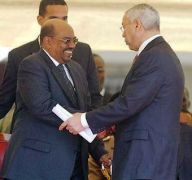NEWSMAKER-Islamist Sudanese general turns to peace
KHARTOUM, Jan 9 (Reuters) – Sudanese President Omar Hassan al-Bashir, who oversaw his country’s transformation into a radical Islamic pariah state, nudged it back towards the international fold on Sunday with a southern peace deal.

|
|
U.S. Secretary of State Colin Powell, right, shakes hands with Sudan President Hassan Omer El-Bashir during the Comprehensive Peace Agreement signing, Sunday, Jan 9, 2005, at Nyayo stadium in Nairobi, Kenya. (AP). |
But the deal to end more than 20 years of civil war in the south, signed in Nairobi, does not cover a separate conflict that has created a new humanitarian crisis in the western Darfur region and prompted fresh international criticism of Bashir.
The army general, born in 1944, overthrew a democratically elected civilian government in 1989 but later surprised many by leading the country towards peace in the south, even offering the southerners the right to secede after an interim period.
Bashir, a career army officer, served at least one tour of combat duty in the south against the rebel Sudan People’s Liberation Army (SPLA).
After years of ferocious fighting in alliance with Sudan’s powerful Islamist movement, his government forged landmark interim peace deals in 2002 with rebels seeking greater autonomy for the mostly animist or Christian south from the Muslim north.
A cornerstone of the southern peace is agreement that Islamic sharia law will not apply in the south. The application of sharia across the ethnically and religiously diverse country was a catalyst for war that erupted in 1983.
Bashir has often accused the West of meddling in the affairs of Africa’s largest country, including in Darfur, and his close political affiliates say Bashir often declared extreme positions, which he could not live up to.
“This highlife that they (the West) enjoy now is a result of the theft of the colonies and their riches and peoples,” Bashir told a gathering in August, with specific reference to Britain, which granted Sudan independence in 1956.
During the first decade of his rule, Bashir alienated many neighbours and Western governments with his increasingly extremist interpretation of Islam and alleged support for Islamic radicals abroad.
Saudi-born al Qaeda leader Osama bin Laden was based in Sudan in the 1990s before being expelled. Egypt accused Sudan of helping the Islamists who tried to assassinate President Hosni Mubarak in the Ethiopian capital Addis Ababa in 1995.
Relations between Bashir’s government and the United States hit a nadir in 1998, when Washington bombed a pharmaceuticals plant near Khartoum it said was making ingredients for chemical weapons. Sudan denied the charge.
Ties with Washington and neighbouring states have improved since Bashir sidelined Islamist ideologue Hassan al-Turabi, once his close ally, in December 1999. Turabi has been in and out of detention since then.
Washington has praised Bashir’s government for its cooperation in the U.S.-led “war on terror” after Sept. 11. But Sudan remains on a blacklist of states Washington accuses of sponsoring terrorism and is under pressure over Darfur.
Bashir came to power in a 1989 coup which ended one of Sudan’s occasional experiments with democracy. He has allowed increasing, albeit erratic, political freedoms in recent years.
He has relaxed emergency regulations introduced when he overthrew the government of former Prime Minister Sadeq al-Mahdi and abandoned a military uniform for traditional Sudanese dress as part of the drive towards normalisation.
He keeps a low profile in foreign media and rarely gives news conferences, but is known to friends as a jovial man who likes to break into dance after giving speeches.
“He has not learned much from his 15 years of rule by way of statesmanship,” said one Sudanese political analyst with close links to the presidency. “He has a tendency to relax and abdicate his responsibilities and not to move to do anything serious until his personal position is threatened.”
Bashir was born in the Nile Valley north of Khartoum, a region whose people have dominated Sudan’s government since independence, prompting other regions to complain of neglect.
The son of a small farmer, he graduated as second lieutenant from Sudan’s military academy in 1966. Bashir is married with no children.
